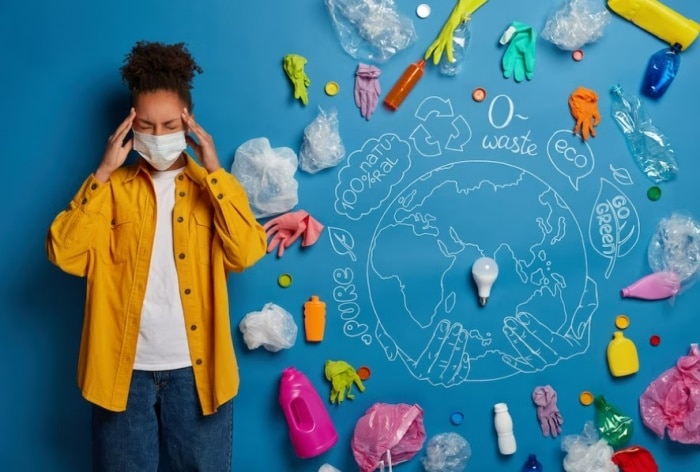Climate change is real and we can see it, but what we may miss is how it is profoundly affecting not only our physical but mental health as well.
It is not uncommon to come across terms and conditions that one might not have heard of before. There are a number of things like PMS, weight loss plateaus, and mommy guilt, which are health conditions that exist, but people are either unaware of or take for granted. But they exist. One of those things is known as eco-anxiety. As the name suggests, it is anxiety related to the environment in which we live. No wonder people are stressed and highly concerned about environmental doom whose weight falls heavily on our shoulders.
What is Eco-Anxiety?
According to the American Psychological Association (APA), “The chronic fear of environmental cataclysm that comes from observing the seemingly irrevocable impact of climate change and the associated concern for one’s own future and that of future generations is called eco-anxiety.”
As published in The Opinion A 2020 survey of child psychiatrists in England published in The Opinion found that more than half (57%) care for children and young people distressed by the climate crisis. A lurking fear of not being able to do anything about the degrading environment is a fear that resides in today’s generation.
Displaced people and forced migrants are among the groups of people most likely to experience Eco-anxiety. Considering the latest tragedy of nature, the earthquake in Turkey and Syria, millions were left homeless and families lost, they lost their livelihoods. Everything is shattered in a heartbeat.
Mala Rao and Richard A Powell, from Imperial College London’s Department of Primary Care and Public Health, say that ignoring the effects of growing ecological anxiety “risks exacerbating health and social inequalities among those more or less vulnerable to these psychological impacts”, while the socioeconomic effects, still hidden and unquantified, “will considerably increase the national costs of addressing the climate crisis”.
Although Eco-anxiety is not listed in the Diagnostic and Statistical Manual of Mental Disorders, it is identified and used by mental health professionals in the field of Eco-psychology -‘a social and intellectual movement that strives to understand and harmonize the relationship of people with Earth.’
Symptoms of echo-anxiety
From the list selected by the American Psychiatric Association, the changing climate affects mental health in the form of:
- trauma and shock
- Assault
- Reduced feelings of autonomy and control.
- feelings of helplessness
- feeling fatalism
- Fear
- existential horror
In case of severe conditions, it can lead to more problems like sleeping problems, appetite changes, difficulty concentrating, etc.
Eco-anxiety in young people
According to The Guardian, the researchers offer insight into how young people’s emotions were linked to their feelings of betrayal and abandonment by governments and adults. Governments were seen as failing to respond adequately, leaving young people “without a future” and “humanity doomed”.
It is now becoming apparent that this alarming climate crisis is not limited to material changes. Along with physical health, mental health is also severely affected, especially in the younger generation. He
Frans Timmermans, Vice President of the European Commission, spoke at the United Nations Conference on Climate Change 2021- Conference of the Parties (COP26) and said concerned that “the sleep-deprived representatives of the 197 parties to the Framework Convention Nations Convention on Climate Change (UNFCCC ) were about to stumble in the last two hundred meters before the finish line” and pleaded with his fellow delegates “just think of one person in your life… who will continue to exist in 2030, and think about how that person will live if we don’t keep 1.5°C here today.”
Coping with ecological anxiety
Some research has found that going for a walk in nature (without technology) can be beneficial for people who have eco-anxiety or climate anxiety. Hobbies like gardening, tree planting, and other similar activities may foster a sense of connection to the natural world. Meditating in nature could also be helpful.
Published Date: June 5, 2023 8:35 AM IST
–>
–>
